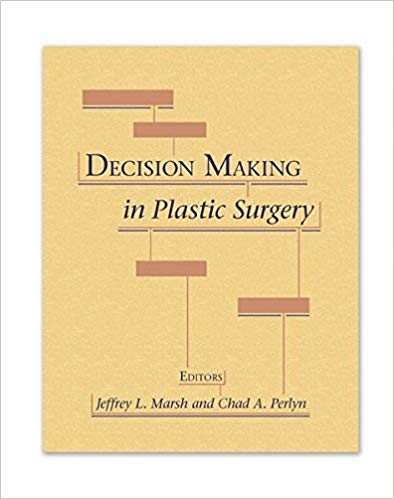
Decision Making in Plastic Surgery edited by Drs. Jeffrey L. Marsh and Chad A. Perlyn, is destined to become a favorite with all students of plastic surgery, whether residents in training or experienced practitioners. It provides essential tools for clinical problem solving for a wide range of aesthetic and reconstructive problems. The unique format, composed of algorithms with supporting text, provides the reader with a virtual roadmap for navigating the decision-making process that characterizes the management of plastic surgery clinical problems.
Comprehensive Coverage
Divided into three parts with numerous subsections and chapters, this book’s coverage ranges from head to toe and from reconstructive to aesthetic. The first part discusses fundamentals and includes chapters on upper and lower facial lacerations, acute ear trauma, acute burns, frostbite, pressure sores, and scars. Part II, Reconstructive Surgery, includes comprehensive subsections on skin, head and neck (congenital anomalies, dentoskeletal malocclusion, craniofacial trauma, neoplasms, and reconstruction), breast and trunk, and upper and lower extremities. And Part III, Aesthetic Surgery, contains sections on skin, scalp, brow and periorbital area, face, nose, breast body contouring, and body contouring after massive weight loss.
Expert Editors and Contributors
Drs. Marsh and Perlyn are talented educators and expert surgeons. They have gathered an impressive group of rising stars and recognized leaders in plastic surgery to write chapters and share their expertise in patient management strategies for different clinical problems.
Unique Format
The decision-making format provides information in a convenient and accessible manner. Readers can compare their approach to that of the experts as they trace the decision trees outlining treatment options for different clinical problems. The design and organization of the book permits quick and easy reading. On the right-hand page, the reader finds an algorithm to indicate the problem, surgical interventions and endpoints, surgical and nonsurgical options, and the hierarchy of what options work best for different situations. On the left-hand page is descriptive text that is keyed into the algorithms so the reader can easily follow the different steps being described. Legends introduce each section, providing a key to the colored boxes, bullet points, and arrows that point to the different treatment options.
This book is essential reading for all students of plastic surgery. It provides a needed life boat when planning any surgical intervention.
Hot Topics
- Body contouring
- Facial aesthetic surgery
- Hand trauma
- Facial fractures
- Limb reconstruction
- Breast surgery

